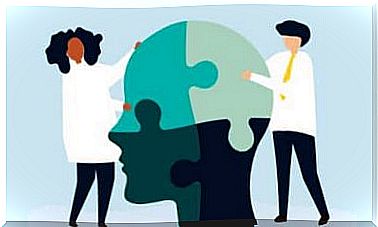Why Do We Lose Control When We Get Angry?

Why do we lose control when we get angry? Do you, too, let go of the first things that come to your mind and that you regret later? Do you ever lose your nerve?
In this article, we discuss the possible reasons that may be behind the loss of anger control. We assume that the loss of control is due in part to poor self-control and low tolerance for frustration. However, they are not the only reasons, as the loss of control often includes grief that we cannot deal with, as well as other potentially unaddressed feelings and thoughts.
Before we get deeper into the reasons for losing control of anger, here are a few tips to help you learn how to deal with anger in a healthy way. And keep in mind that self-control is a skill that can be honed! So keep reading and find out how it works.

Why do we lose control when we get angry?
It happens to many people often and to others a little less often… We get angry and lose control, we can’t control ourselves. It is a feeling where anger overcomes us. But then why does this happen? What really fails in this situation? What is behind this uncontrollable anger?
To understand all this, we need to resort to the concept of “self-control”. Later, we will also see other factors that may contribute to facilitating the loss of self-control as well as contributing to those conditions that increase the likelihood that we will become impulsive.
The importance of self-control
Self-control is defined as the ability to control emotions, behaviors, thoughts, and desires. It also includes the ability to control and control our own body. In a way, self-control is part of emotional intelligence, and that’s why it’s so important to work with as young children as possible. Self-control allows us to learn to control our anger, but also our other emotions.
As we can see, self-control is the ability to control not only how we behave, but also how we think and how we react to emotions. In many cases, the turmoil of emotions transcends us, but this should not be a reason for us to lose control of the situation. Self-control, like many other skills, is also possible to practice, meaning it can be improved over time, perseverance, and effort.
How to develop self-control?
With self-control, we can control those moments of anger or rage where we start shouting or doing or saying things that we then later regret. But how can we work on self-control? Here are some key ideas to help you develop your own self-control:
- First, identify exactly what you want to control. Is it anger? Rage? Or perhaps a feeling of frustration?
- Investigate the causes of anger and rage. Are you really angry or do you cover other feelings with it, like sadness?
- Look for “no return”; This is the moment when we know we can no longer stay calm, the moment when we lose control and “explode”. Recognize this moment and look for the word or gesture you give it when you want to stop it in time.
- Practice breathing; just when you recognize the point from which there is no going back, and before you reach it, Practice a few breathing exercises. Close your eyes, put your hands on your stomach and feel the air pass in and out of your body.
- Look for alternative behaviors to anger so it doesn’t control you; they can be the aforementioned breathing exercises or other behaviors or activities, such as listening to music, taking a relaxing bath, painting or drawing, writing, or simply leaving the environment or situation where you feel anger.
I get angry and lose control: what’s bothering me?
We have listed above some ideas for practicing self-control and shared the first steps to a healthy encounter with anger; however, in addition to applying these techniques, it is also important to understand what is happening to us. Why do we behave this way when we get angry? At this point, you may have sensed one of these possible reasons… Poor self-control is indeed the main reason that makes us act this way, losing control of the situation when anger consumes us.
On the other hand, low resilience to frustration may also be the reason behind such a pattern of behavior that we so often fall into. Impulsive and temperamental people can also contribute to the emergence of such situations.
The good news, however, is that all of these conditions can be worked through therapy. When we take a deeper look at the reasons for this “loss of control” and why we get angry, we can both get to know ourselves better and, in addition to this, look for different strategies to improve our self-control and thereby also improve our overall well-being.

There is a mental wound behind the anger
Behind the anger or rage, in many cases, lies a large mental wound that is revealed at that moment or that someone or something has inadvertently caused to emerge. And this is because anger, rage, anger are emotions that often obscure other emotions, such as sadness or disappointment. Because we don’t know how to cope with or manage this grief (or we can’t accept it), we resort to some other emotion that gets us momentarily out of that uncomfortable feeling: and this is often a feeling of anger.
And what happens when even a feeling of anger cannot be handled properly? Well, this will eventually lead to us simply exploding. Therefore, if you feel that you often lose control of your emotions – for example, you say things that you will soon regret – we will encourage you to seek help.
Understanding emotions and the purpose of their existence, allows us to feel ourselves and evolve every day as those imperfect people that make us human! We should learn to live with that imperfection and learn from it to become better people, and we should never forget it.









